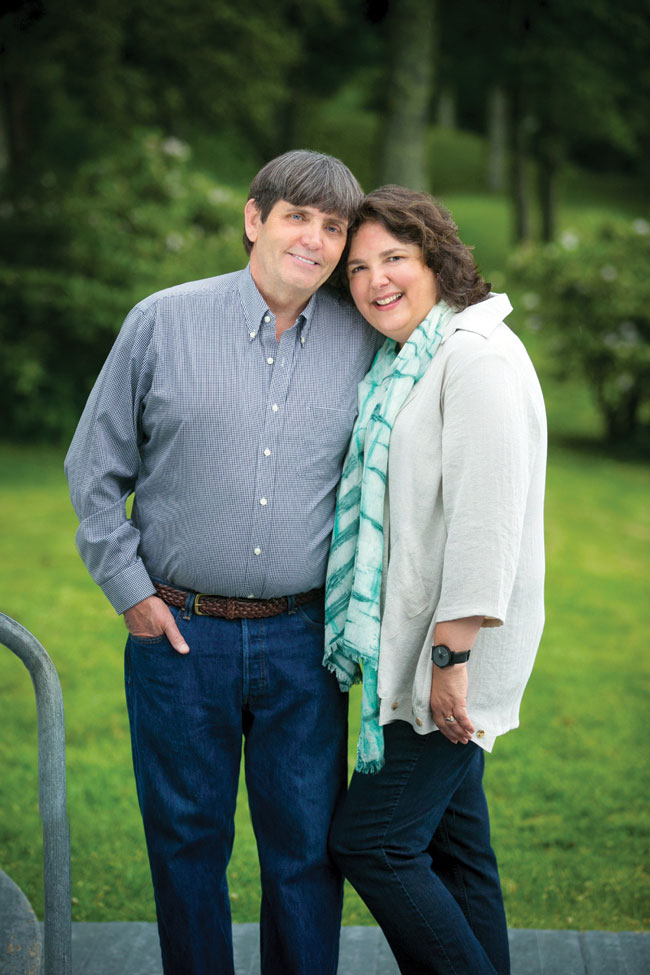
diagnosis of and successful treatment for prostate cancer, he’s become an outspoken
advocate for regular health screenings for men. (Burton Photography)
The weeks that followed remain a blur for both of us. Thankfully, there was no evidence the cancer had spread to the bone or to any other organ. But that didn’t mean we were out of the woods. It was no longer a question of if or when to deal with Bob’s prostate cancer, but how. To quote Dr. Patrick Walsh’s Guide to Surviving Prostate Cancer, Bob was in the “gray zone,” confronted with the choice between surgery or a combination of hormone and radiation treatments. “Here, after weighing all the facts, is where your own judgment matters most,” Walsh writes.
After hours of research, doctor visits yielding multiple opinions, and a clinic case review at a leading research hospital, we arrived at what we thought was our final decision. He’d undergo radiation and hormone therapy, rather than surgery. Because the cancer had already escaped the prostate, eradicating the cells and attempting to slow their spread seemed our best option. The two surgeons we spoke to were reticent to try to remove the prostate; the chances were small that they’d get all of the cancer that way. Further, even to attempt surgery, they’d have to take out more of the surrounding tissue than if the cancer were contained in the gland, and they would not be able to spare the nerves necessary for sex.
This was not, they explained, a cure. But it was the best advice they could offer given the circumstances.
Bob and I were still struggling to come to terms with this choice when a chance meeting changed everything. I was
at a business lunch in my role at the time as senior vice president of sales and marketing for the Baltimore Sun. At the lunch was prominent local urologist Dr. Sanford Siegel, who had joined me to discuss advertising for his large practice. But Bob’s condition was never far from my mind, and when the subject of the newspaper’s support for a prostate cancer fundraiser came up, I couldn’t stop my tears.
I tried to apologize for the distraction, but Siegel would hear none of that. “Who cares about business? This is a matter of life and death,” he said.
He insisted on conducting a case review on the spot, gathering information from me, and asking some of his colleagues, who happened to be having lunch in the same restaurant, to comment on Bob’s condition. He then made a phone call and paved the way for us to see a colleague, Dr. Herbert Lepor of New York University Langone Medical Center, who specializes in complicated prostate cancer surgeries.
Bob and I met with Lepor the next week. Unlike the previous surgeons, he advocated surgery, telling us there was a good chance he could remove all the cancer and Bob could retain continence. He did warn there was only a 50 percent chance he could spare enough nerves for Bob to achieve an erection, but Bob was OK with that. “I don’t want to live with a ticking time bomb inside of me,” he said.
Although complex, the procedure was by all accounts successful. Surgical margins — the area on the outside edge of the tissue that was removed — were clear of cancer. Bob’s PSA level post-surgery was undetectable. However, the cancer cells that were removed from his prostate were more aggressive than the biopsy samples had been and there was a “speck” of cancer on one lymph node. Statistics show that based on these findings Bob was at high risk for recurrence as micrometastases — undetectable areas of cancer outside the prostate — may have spread from this lymph node into other parts of his body. He was clearly better off than if they’d merely targeted the cancer with radiation and hormone therapy.
Still, once again we were in the gray zone. Should we do radiation right away (which could potentially cause the side effects we had hoped to avoid by choosing surgery) or wait and see if there were more definitive signs of recurrence? Once again, the PSA test was the tool for guiding our decisions. Monitoring his PSA level every three months, we got good news each time — undetectable. And statistics show that an undetectable PSA after the first year is a very good sign that the cancer has not spread.
So in September 2013, we celebrated our second Prostate Cancer Awareness Month with two milestones: my husband’s 60th birthday and one year cancer-free. We went on a dream trip, a safari in Tanzania, where we witnessed one of the most dramatic life-and-death scenarios in nature — thousands of migrating wildebeest crossing the Mara River, dodging fierce crocodiles. We will always remember hearing the Swahili version of “Happy Birthday” and sharing a cake with our fellow travelers in the central Serengeti.
We came home just in time to participate in our local ZERO Prostate Cancer Run/Walk fundraiser. In addition to a blue ribbon, Bob was given a cap labeled Survivor. That cap seemed to make him a safe person for newly diagnosed men to talk to about treatment options. Bob argues that it’s not fear that keeps men from asking questions, but rather a lack of reliable sources: “They don’t know where to turn. I sure didn’t.”
Bob also implemented a radical lifestyle overhaul to make his body as inhospitable to cancer recurrence as possible. “I have taken responsibility for my body and health in ways I never imagined a few years ago,” he says. After working with a naturopathic doctor who specializes in helping prostate cancer survivors, Bob now makes kale smoothies with a top-of-the-line Vitamix blender for breakfast, takes supplements, and works out almost every day.
Bob was never incontinent, but he did struggle for a time with sexual performance. He worked with a doctor at Chesapeake Urology and now, with the help of injections, our sex life is back.
Become a Saturday Evening Post member and enjoy unlimited access. Subscribe now




Comments
I also had no history in our family, but my family doctor was always checking PSA with every physical over the years. I had a small move in numbers and he had me retest. I was 52 and has a urologist perform a biopsy to verify another change in numbers just to be safe. The biopsy confirmed I had prostate cancer.
At the time, my employer was “reviewing insurance options”. I told them I had to know where they were at with the process so I could decide my treatment options. They told me not to worry, we would have some kind of insurance, and if I had cancer, this was “the best one to have”. That was on a Friday. On Tuesday every employee gets an email saying they will no longer offer insurance and our policy would expire in 1 week. I was torn, as I felt I had no choice to make as there was no time, and with the diagnosis, I wouldn’t have a chance to get insured elsewhere.
On Wednesday, the urologist called me at 3 pm, aware of my delema. He asked if I wanted to have it removed. If so, I needed to be at the hospital the next morning at 10am. He rearranged his schedule, vacation – everything, so I could have the surgery and be discharged from the hospital the day before the insurance expired. It was so surreal how everything came together.
I feared the same things your husband did regarding my sex live with my wife. I am happy to report, the first year was tough, but I think some of that was psychological. I have been cancer free for 5 years now. I am amazed at how many men I know have it, and are in stage 3 and 4 now because they were never tested. Your quoted numbers are staggering, but people still are not aware because prostrate cancer seems to have a stigma to it and no one wants to talk about it. We have 5 boys, and I will not be quiet about it. I was lucky to be diagnosed early, and it was contained to the prostate. I too hope it gets the recognition it needs so we can save more lives. Thank you for your story. I will be passing it on!
With September being cancer awareness month…
A good article well worth reading. Informative and sobering.
For me, good thing I got my annual physical every year because at 52, I got it about 10 years earlier than the average. If I had not found it early it would have spread by the time I reach my 60’s!
We should see as many blue ribbons as pink, but unfortunately prostate cancer is not talked about much…
Ms. Berman,
Your husband’s story is very similar to my own. His making kale smoothies brought a smile, although I refer to mine as a kale slurry. I have a adopted a vegetarian diet in an effort to avoid a reoccurrence. I hope we will see you and your husband in the Survivors Circle at the Zero Prostate Run this year.
I lost my husband to prostate cancer almost 5 years ago. He was diagnosed at stage 3 at the age of 52. Every dr that had examined him said his prostate was remarkably small and no signs of cancer. Even when he had symptoms, his urologist said there was no way he could have cancer. He was too young. After months of testing for other causes they finally did a biopsy. He had a Gleason Score of 9. He had radical surgery, radiation, hormone therapy, chemotherapy and every clinical try they could come up with. We had 5 years of battle before it finally took his life at the age of 57. I pray for and remind men every chance I get to be checked. I feel the medical community still down plays the fact the prostate cancer does take lives.
Correction, it was not 118 months but rather 18 months.
Your story is very similar to ours. In April 2011 I was back in St Louis where my dad and I were starting hospice for my mother who was in her last month of life battling colon cancer. My husband Dave had had a biopsy done right before I left Texas and we were waiting on the results, not expecting any bad news. I will never forget the sucker punch to the gut I took when he told me that he had prostate cancer over the phone. I just remember screaming on the side of the road after we hung up.
Shortly after my Mom’s funeral, Dave had his prostate removed. Likewise our surgeon felt good about his margins and he never had a problem with incontinence. The first year he had good PSA results but 118 months after surgery, the cancer had returned.
We than entered into the world of hormone therapy and 9 weeks of radiation. 12 months post radiation, we are still at undetectable and are hopeful that his next PSA in Nov will be consistent.
Our sex life pre-cancer is gone…I miss that aspect of our relationship and at times, it’s very difficult. However, we have grown closer and our relationship is more intimate than before. I would rather have the closeness that we share now than all of the physical components of our relationship as it was.
On the 27th, we will be participating in our 4th Prostate Cancer 5K. We have been able to use our experiences to minister to others who are in uncharted territory. My husband is my hero…
This is an important and beautifully-written story. Thank you to you and Bob for sharing.
Thanks for Judy Berman’s article regarding prostate cancer. We went through that a few years ago and my husband was told to have the surgery. We were not told about the advantages of robotic surgery nor anything else. The results were very frustrating for my husband, as it affected his urinary tract, etc. It has been an emotional journey for us. I recently checked with the American Cancer Society and there is NOT a support group for prostate patients in Nashville, TN. We certainly need one.